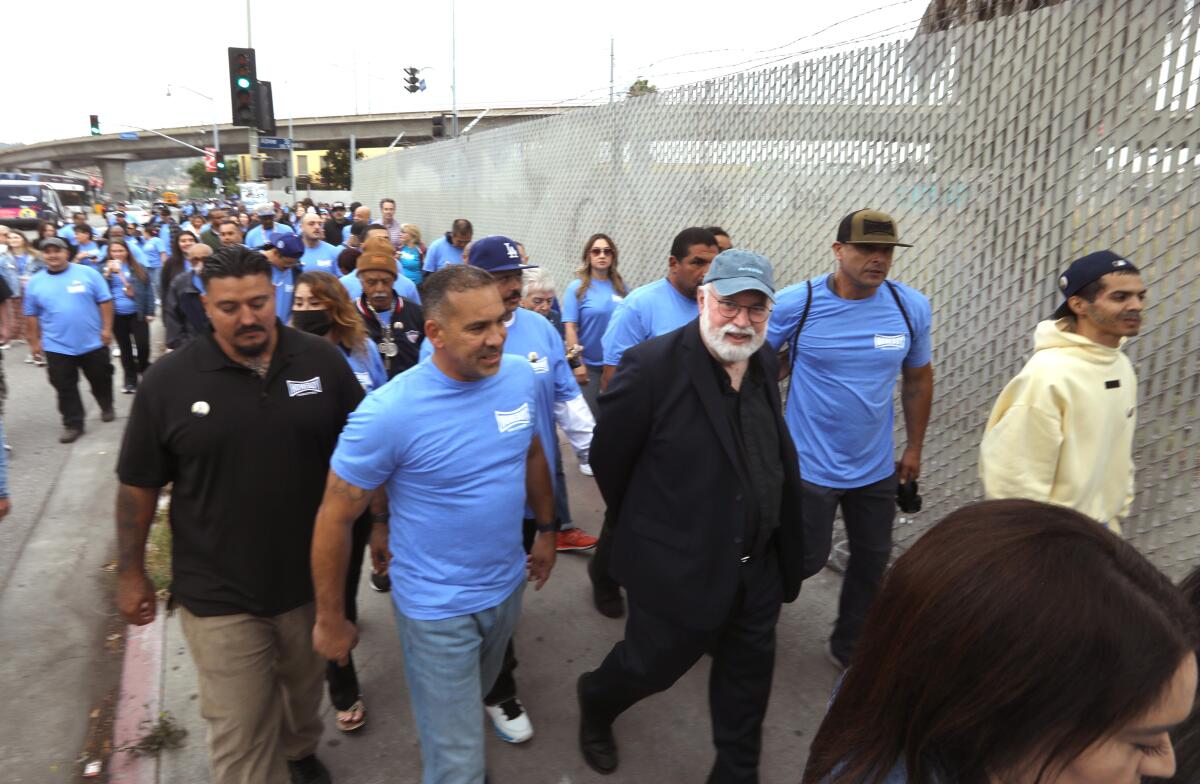Homeboy Industries has launched a fundraising campaign to raise $100 million for a major expansion of its downtown operations.
A rehabilitation center for gang members has big plans to upgrade its campus next to Men's Central Jail in the city center to accommodate more people and teach more skills.
Homeboy Industries founder Father Greg Boyle and real estate developer Frank McCourt announced a campaign Friday to fund the complex, which would include transitional housing for people leaving prison and provide services such as health care, drug treatment, job training and career development.
McCourt, founder of McCourt Partners and former owner of the Los Angeles Dodgers, pledged the first $10 million to launch the campaign. Homeboy hopes to raise the remaining amount over the next five years from private donors, as well as corporate and charitable organizations.
Homeboy was founded 37 years ago to help thousands of ex-convicts and gang-involved youth learn new skills and avoid returning to jail or prison.
Homeboy is already “the largest gang rehabilitation program on the planet,” Boyle said, with 500 trainees and 300 employees at any one time, most of whom have completed the rehabilitation program themselves.
Well-known businesses that hire interns include: Home bakery And Home cafe in Chinatown.
A successful expansion could serve as a national example of how to break the cycle of young ex-offenders returning to prison rather than becoming productive citizens because they see no other way forward, Boyle said.
“We are a provider of hope to people for whom hope is alien,” he said.
Rendering of planned service housing for Homeboy Industries in downtown Los Angeles.
(KFA)
Temporary housing will help them find their footing, he said, since 70% of people in the program are effectively homeless, sleeping in their cars or couch surfing.
The first phase of development will be a 200-unit housing project that will be built on land previously used to store damaged police vehicles, Boyle said.
Thereafter, there will be 35,000 square feet of space dedicated to providing essential services to trainees, including mental health care, substance use disorder treatment, job training and career development.
The expansion, designed by Culver City-based architecture firm KFA, will increase Homeboy Industries' capacity to provide education, legal assistance, health care and reentry services, Boyle said. Other services include tattoo removal.

Father Greg Boyle, bespectacled and sporting a white beard, marches with members of the Homeboy Industries program to City Hall for Greg Boyle's Father's Day ceremony in Los Angeles on May 17, 2024. The vacant lot behind the fence is slated to become part of Homeboy Industries' expansion along Alameda Street in Los Angeles.
(Genaro Molina/Los Angeles Times)
As part of the expanded Homeboy campus known as Fr. Gregory Boyle Center for Radical Kinship, Homeboy Art Academy will expand to a new 5,000 square foot space where hundreds of people can learn about creative expression in various art forms.
The art program is among 14 social enterprises Homeboy operates, which include catering, dog grooming and electronics recycling, Boyle said.
During the 18-month training program, apprentices work in all 14 social enterprises, learning new skills, Boyle said, “and when their 18 months are up, we find work outside of Homeboy.”
Project Homeboy aims to expand the area's cluster of charitable services, including transitional housing for the homeless provided by the Weingart Center and a complex of affordable housing and health services planned by the California Foundation.
McCourt said his $10 million pledge is intended to “prime the pump” to begin expansion and that his firm will provide real estate expertise to help navigate design, construction and other aspects of real estate development.
McCourt attended Jesuit schools, including Georgetown University, and said he was moved by Boyle, a Jesuit priest,'s approach to addressing what McCourt sees as the “dehumanization” of people who have survived incarceration, gang life and other problems.
“We need to get back to treating people as human beings with dignity, respect and opportunity,” he said. “Economic development helps because it brings jobs and vitality, but it's really about taking care of people.”








